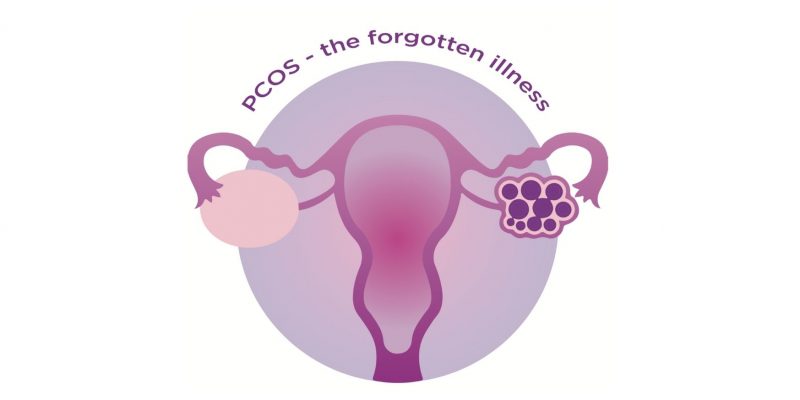PCOS currently stands as one of the most incurable hormone disorders that affects women in their childbearing years, with such a big psychological impact, why is the mental health side of PCOS being overlooked?
The Lowdown on PCOS
Polycystic Ovary Syndrome (PCOS) is a genetic and reproductive disorder that affects approximately 1 in 10 women in the UK, with around 50% of PCOS cases going undiagnosed, most women don’t even realise they have it.
There are numerous physical long-term health risks that are associated with PCOS, such as, an increased resistance to insulin, type 2 diabetes, and the saddest of all, infertility.
But while there is still so much focus on the physical health risks, the non-physical concerns are being forgotten.
Those who suffer with PCOS, are 3 times more likely to suffer with mental health problems than those who don’t.
To name a few, depression, anxiety, bipolar disorder and eating disorders are all very common in people who have been diagnosed with PCOS.
But why is this not spoken about enough? Surely your mental health is just as important as your physical health.
The ongoing research
More and more researchers are pioneering the knowledge into how PCOS affects mental health.
Professor Aled Rees, who is head of the research team at Cardiff University’s Neuroscience and Mental Health Institute stated: “This is an important public health condition, and many policymakers may not be aware of how common the condition is and the potential impact that it has on mental health.”
Their study consisted of assessing the mental health records of 17,000 women that are diagnosed with the condition alongside investigating the records of multiple primary care practices across the UK.
Their findings show that those women that were affected by PCOS were more likely to also suffer with mental health problems in their lifetime.
Aled and his team are looking to extend this research to hopefully find a clear answer as to why PCOS has such an effect on a person’s mental health, and looking at ways exercise can improve the mental health problems in women.
Alongside the research team at Cardiff University, psychologist and research coordinator at UCL’s Institute for Women’s Health, Dr John Barry has made his career focused on the psychological impact of PCOS, he has even written a book on the mental health implications.
He revealed his advice to give to those struggling: “The cause of depression might be the symptoms of PCOS, such as feeling bad about fertility or facial hair, my advice is to try to treat the physical symptoms (e.g. fertility medication) as a priority over treating the mood.”
There is growing evidence that relaxation-based treatments can help with both emotional and physiological issues. Some people may argue that this could be a little far-fetched, but in my opinion, there is good evidence for yoga, mindfulness, and relaxation to help ease the symptoms of depression and anxiety.
Dr John Barry added: “Other advice would be to join a support group, especially one that is active in campaigning for more awareness of PCOS.”
If you are looking to gain support head to the UK PCOS charity, Verity.
Turning the diagnosis around
‘I’m Fine Attire’ is a UK based fashion brand that works to create clothing that is supportive for people with chronic conditions such as PCOS.

The goal of the brand is to remain functional for people’s illnesses, (such as certain pieces containing heat packs) but also allowing women to feel confident in the clothes they are in.
Creator of the brand, Emma Gayle suffers from PCOS and endometriosis, her chronic conditions are what led her to create her own brand.
Emma stated: “I’ve got a chronic condition myself and my cousin also has the same, at around the end of last year, we were both really low self-confidence wise, both in and out of hospital and we just couldn’t find anything to be comfortable in apart from pyjamas.”
She added: “I started researching what was out there, found there wasn’t much, I started speaking to other people, and everyone sort of felt the same, there was very little to wear that functioned for your symptoms.”
Emma was experiencing the all-too-familiar symptoms of PCOS, such as acne and hair loss, but didn’t realise there was something wrong until she gave birth to her second child at the age of 21.
After months of waiting around for an appointment, she decided to spend the money to go private, and the doctor advised she attended an ultrasound appointment to look at her ovaries.
Around a week after her scans, Emma was rushed to hospital with two ruptured cysts that needed to be removed imminently.
Emma revealed that only after her traumatic experience doctors began to taker her seriously.
While juggling two small babies, and a diagnosis looming over her, Emma’s mental health began to deteriorate, her constant battle with depression and anxiety affected her daily life more than she ever imagined.
“You lose your identity, that’s what makes your mental health go downhill, so many symptoms, like when you’re going about your daily life, it’s not so much of an issue and then all these problems start happening and you’ve got all these appointments, it’s really overwhelming to deal with.”
Her brand who she worked to bring off the ground alongside her cousin who also suffers with PCOS, has grown immensely in the past six months since its initial launch.
Emma stated: “I was at a good point when we first launched, but I feel like it’s one of those waves when my symptoms flare up my mental health struggles, but knowing we are helping people it gives you that drive and boost to keep going.”
Emma is now continuing to look towards the future and the growth of the brand, “The main aim is for people to be comfortable and get that identity back that you lose when you have chronic conditions.”
She added: “I hope it creates the change, and it gains the awareness for the conditions but also becomes more normal that you know things can be adapted and still look nice.”
More from this project:


 Petition to allow #bpd on Instagram nears 10,000 signatures
Petition to allow #bpd on Instagram nears 10,000 signatures
amaya
Absolutely agree — the mental health side of PCOS really needs more attention! It’s heartbreaking that so many women suffer in silence with anxiety, depression, and low self-esteem on top of the physical symptoms. Thanks for sharing such important research and stories like Emma’s. Raising awareness and supporting each other can make a huge difference. For anyone struggling, resources like SheMed can be a great help. Let’s keep talking about this!
Adamina Harrison
Thank you for raising awareness about the mental health side of PCOS — it’s so often overlooked despite how much it affects women’s lives. Emma’s story and her work with ‘I’m Fine Attire’ is really inspiring and shows how important it is to feel comfortable and confident while managing this condition. For anyone looking for more support and information on women’s health, I recommend checking out https://www.shemed.co.uk. It’s a great resource.
Aria Walker
The emotional impact of PCOS is often overlooked, even though it can deeply affect confidence and mental well-being. Addressing both physical and psychological aspects—through support, mindful living, and balanced nutrition—can make a real difference. Understanding the glycaemic index may also help manage symptoms: https://www.shemed.co.uk/blog/understanding-the-glycaemic-index-gi-for-better-food-choices
.
Aria Walker
This article highlights the often-overlooked mental health impact of PCOS and the importance of addressing both physical and emotional symptoms.
Supportive strategies, including lifestyle changes, therapy, and tailored treatments, can help improve overall well-being.
Information on treatments that target metabolic health and weight management, such as Wegovy, is discussed here: https://pharmacy4you.co.uk/wegovy-for-pcos/
Aria Walker
This piece highlights how PCOS affects both physical health and mental well-being, which is still not discussed enough.
Alongside emotional support and lifestyle approaches, some people also explore medical options that address metabolic factors linked to PCOS.
Background information on Wegovy 1.7mg pricing in the UK can be found here: https://pharmacy4you.co.uk/price-comparison/cheapest-wegovy-1-7mg-price-uk/